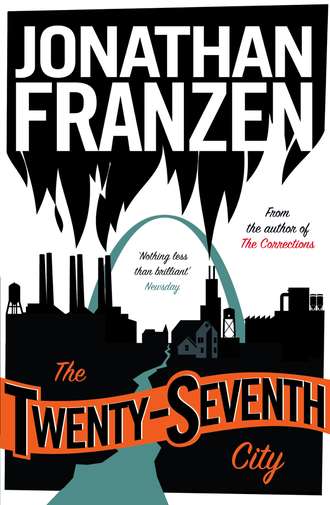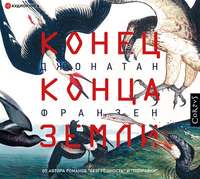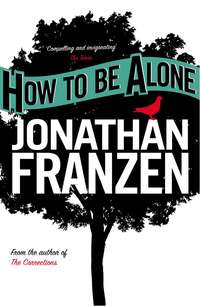
Полная версия
The Twenty-Seventh City
Sonnenfeld put his hands on his hips and assumed a disappointed tone. “William Carlos Williams was a doctor. He lived all his life in Paterson, New Jersey. As we go on, we’ll find that it’s not unusual for American poets to have other full-time professions. Many have been teachers. Wallace Stevens, who’s perhaps our greatest poet of this century, a very hard poet, worked for an insurance company. He was a vice president when he died. Sylvia Plath, whom I’m sure you’ve all heard of, was a mother and a housewife.”
Vague guilt fluttered in Luisa’s stomach. The Wallace Stevens book her mother had given her.
“Archie?”
Archie shook his head patiently. Luisa looked at his long, angular fingers. She thought of Duane’s hands. On the palm of her own left hand his name was written in black ballpoint ink. She’d written it in Calculus, half-asleep. She’d hardly slept last night. For the third time in a month, she’d sneaked out to be with Duane. She’d gotten to the sundeck from her bedroom window, and from the sundeck she’d climbed, knees cracking, feet trembling, down the step-like quoins to the front yard. It was amazingly easy, like an open cash register and no one around. Her parents never went into her room after 11:00. The last Lockwood Avenue bus to U-City came at 12:05. She could see Duane any night she wanted to, and she liked it better at night, when she could see herself, a white semi-reflection in the bus window staring into her face and unmoved by the streetlights and neon floating through her. Duane was waiting at the bus stop, his scarf under his chin, a lock of hair above his eyebrows. He shook his head. He could never believe she was actually on the bus.
“… Amy Lowell and Ezra Pound, who were both profound influences on Williams.”
“Bow bow bow,” said Archie, snatching at an imaginary bug in the air.
“Archie?” Sonnenfeld was getting mad. The pitch of his voice had risen.
Janice Jones had fallen asleep.
Luisa looked down at the copies on her desk, THE RED WHEELBARROW. So much depends upon a red wheelbarrow glazed with water beside the white chickens. That was easy enough. She liked short poems. She went on to the next one and, finding it just as easy, kept reading. She didn’t stop until she sensed an unanswered question hanging in the air. Sonnenfeld had asked them something. She ran the preceding seconds through her memory and heard, from afar, “What was imagism?”
Without raising her hand she called out, “Free verse, strong images that appeal directly to the emotions.”
“What did you say to me?”
She looked up with a start. Sonnenfeld had gotten down from his desk. He wasn’t talking to her. He was talking to Archie. He hadn’t even heard her answer. Archie was enlarging the gray dot, smiling.
“What did you say?”
“Fag,” Archie said.
“I didn’t hear you.”
Luisa drove her nails into her palms and stared at her desk, the way everyone else was staring. She tried to force the blush back out of her cheeks. What an idiot she was. The halls had grown quiet for a moment. Sonnenfeld was walking down the aisle. She heard the unhurried scratching of Archie’s pencil. Then a scuffle, the rumble of a desk’s metal feet on linoleum, the plink of a pencil. She stole a glance. Sonnenfeld had grabbed Archie by the collar and was hauling him towards the door. He pushed him out and followed him. From the hall, the class heard, “What’d you call me?”
There was a murmur from Archie.
“What?”
“Fag.”
“What, nigger?”
“Fag.”
“Nigger!”
FAG!
NIGGER!
It stopped. It had to. Sonnenfeld was dragging Archie down to the vice-principal’s office. Still feeling the pressure of attention on her, Luisa laid her cheek on her desk and shut her eyes. Outside, a pep parade was approaching to the tune of “Old Wisconsin.”
On with Webster, on with Webster Fight fight fight fight fight
The trumpeter had to slur and blurt to keep up with the singers. As the group passed the door, Luisa heard footsteps. Some of the class was deserting. She heard a match struck and raised her head. Janice Jones was lighting a cigarette.
Tonight Luisa was supposedly going to the Bonfire and then staying over at Stacy’s. Actually she was going out to dinner with Duane and spending the night with him. There had been a lot of this supposedly-actually in the last three weeks. On her birthday it had gotten complicated. Stacy had even called Luisa’s mother for suggestions about what kind of breakfast and what kind of presents. Stacy had a mother like Duane’s, the convenient sort of parent who worked full-time and who’d believe there had been a party in her house even if there hadn’t been. Luisa wasn’t as much afraid of getting caught as she was sure that one of these weeks, in her tiredness, she’d forget which side of the window she was on and do something stupid at home, like French-kissing her mother or calling her father “Baby.” She could feel the impatience inside her. Why don’t people who like each other kiss all the time? Why do people have to lie? She was feeling more honest and acting less honest. It was a dangerous mixture, like gasoline and wine, like fever and chills. She still had a cold, sort of a permanent cold, the sense that none of the things that used to matter mattered anymore. She could do whatever she wanted. She could just say: “Give me a cigarette.”
Janice Jones looked astonished. “They’re menthol.”
Luisa shrugged. When the match was held she inhaled lightly to keep from coughing. To her relief the smoke was mild, like a breath of mothballs. Janice Jones folded up her poems and stuffed them roughly into her purse. She looked at Luisa. “Bye,” she said. It was the friendliest she’d ever been.
“See you.” Drawing on the cigarette, Luisa felt almost as cool as Janice. Unfortunately the only two kids left in the room to appreciate her now were Alice Bunyan, who sketched horses during class, and Jenny Brown, who had large sad eyes and a lisp, wore overalls, and never knew the answers. Neither cared about Luisa. She closed her eyes. She felt a tiny breeze, a feathery impact on her stomach—the ash breaking loose. She opened her eyes.
Sonnenfeld.
He was leaning with both hands on the front desk in her row. He was staring at her. “May I ask what you’re doing?”
She didn’t answer. She dropped the cigarette and smashed it with her heel. Sonnenfeld laid a green slip on her desk. Smokig i classmm. “Sorry,” he said coldly. “I’d expected more from you.”
She gathered her books and shouldered her purse. Somehow her body couldn’t believe it was leaving. The vice-principal could suspend her for three days for smoking, and barring that, a call to her parents was virtually assured. At the door she stopped and looked into the hall. There were ruptured oranges on the floor, and construction-paper artwork on the doors of lockers belonging to members of the football team. The pep club had drawn crude portraits of each member and given him a slogan. #65 WILLY FISHER “DR. MEAN GUY.” The lockers looked like tombs. Luisa turned back uncertainly to Sonnenfeld.
He was seated on his desk with a book in his hand. He licked a finger, turned a page, and addressed his two remaining students. “So much—depends,” he said.
“Just leave those spaces blank, White.”
“Done. What do we say? Gateway Arch?” RC’s fingers played the keys. Gateway Arch. “Address?”
“Forget the address.”
“Shot in the leg, right?”
“Very funny. Southern leg, eastern face, hit by automatic fire.”
… automatic fire. “Means?” RC said.
“High-powered automatic rifle firing steel bullets.”
… steel bullets.
“Object of attack unknown. Distinctive feature: pattern of dents traced the letters O and W. Rest of that column blank.”
… letters O and W. “Now, I know the suspects,” RC said.
“Shut up, White. I’m dictating. Understand? Name unknown, sex male, height five-ten to six-two, everything else unknown.”
Unknown. Unknown. Unknown.
“Bottom of the page. Three-sixteen a.m., November et cetera, Donald R. Colfax of Gateway Security Systems, 1360 DeBaliviere, telephone three three six, one one seven one—reported the sound of gunfire near the southern end of the Arch. New paragraph. Three-eighteen a.m., Officers Dominick Luzzi and Robert Driscoll—double z-i, White—dispatched to the scene by radio. New paragraph. Three-twenty a.m., Colfax stated that upon hearing the gunfire he hastened in that direction from his desk in the northern underground lobby of the Arch.”
“Hastened” RC said, “in the direction of a machine gun?”
“Appearing at the location of the shooting, he glimpsed—”
… lobby of the Arch.
“—the above-described suspect fleeing through the trees to the south of the Arch. Colfax stated that the suspect was carrying—”
“Luzzi, phone!” Desk Sergeant McClintoch barked.
“Take a break, White. Appreciate the circumstances. My wife’s ten months pregnant. Relax, take a break.”
RC relaxed. He peered into the lunch bag Annie had filled for him. Egg salad on rye, brownies, and an apple. He was starving, but he wanted to eat late because he had a Legal Procedures class from six to eight at the Academy. Then tomorrow he had the day off. Tomorrow was Thanksgiving. The precinct-house atmosphere was pre-holiday, a little frantic.
The man at the next desk was scowling as he hunted and pecked. RC, who’d typed a million histories in the Army, was a ten-finger man. In the Army he’d trained on a machine gun, too. “Aim, don’t spray. Pick a target, five shots, next target, five shots. Ata-baby.” But machine guns weren’t precision instruments; you’d need damn strong arms to write something with one, even just the initials of your terrorist group. If RC ever got challenged to a duel at dawn, he’d choose a typewriter for his weapon. Rat-a-tat, rat-a-tat. The alphabet at ten paces.
He took another look at his lunch. Ten more minutes, he told himself, picking at the rip in the vinyl cushion of his chair. On the green wall two desks to his right was a 12 × 15 glossy of Chief Jammu with Sergeant Luzzi, taken in August on the steps of the precinct house. RC himself had only talked to the Chief that one time after the explosion, before he’d signed up, and he’d only seen her in person one other time, when she gave a talk to the new recruits at the end of their first week. He couldn’t remember a word of what she’d said, but it was good, whatever it was. And he had no problem with how they’d been treating him, aside from some superciliousness on the part of the younger white officers. It was a tight ship, this department, a lot more electrifying than the Cold Ice Company and a lot less dumb-assed than the Army. When they tested his gun skills here and he passed the test, they told him to stop going to the range and assigned him extra hours of office work. He put in thirty hours a week—work-study, the Chief’s idea. With all this plus the classes too, he was busy. But in February he’d graduate and things would be a little easier.
Luzzi was still gabbing on the phone. Didn’t look like his wife was delivering yet. It would have taken Luzzi nearly an hour (plus however long he spent on the phone) to type this report that RC could do in ten minutes. As far as RC knew he was the fourth-best typist in the whole first precinct. He’d heard officers say: “In a hurry? Take it to White there, if you don’t mind his lip.”
The only real ragging these days came from Clarence. “I swear to God,” he said, “I never thought I’d be sorry to see you moving up. But even ice beats the heat. I hate to see you playing their game.” Their game was the Chief’s game. Lately Clarence had been hitting his golf drives too fat. He wasn’t on speaking terms with Alderman Struthers, and his business was hurting. Not hurting too bad (this city never ran out of junk to demolish) but still hurting. RC couldn’t make Clarence see that this had nothing to do with the Chief.
“Read it back, White?”
Luzzi had returned, and RC turned back to the typewriter. “Colfax,” he read, “stated that the suspect was carrying …”
“A weapon,” Luzzi said. “A weapon.”
“Big surprise,” RC said, and waited to be told to shut up.
At company headquarters in South St. Louis, Probst watched Bob Montgomery and Cal Markham, his vice presidents, file into his office and take chairs. They were here to plan Westhaven strategy. “Well?” Probst said.
“We get a day like this,” said Cal, “it changes things. This is snow weather.”
Outside the window, in an afternoon sky that was almost black, a pigeon spread its wings and decelerated, like a newspaper unfolding in the wind. They always flocked around the precinct house across the street.
“It’s not snowing in Ballwin, is it?”
“No,” Cal said.
Bob gave Cal a sharp glance. “Flurries.”
“How’d we get into this mess?” Probst said.
“We didn’t know how big the sucker was. We knew, but we didn’t.”
“Or how far out it was,” Bob added. “Those last three miles.”
“I’ll tell you what it is, it’s we didn’t think we’d get the contract.”
“Let’s think a minute,” Probst said.
“I’ve been thinking all month,” Cal said.
“Let’s think.”
The problem was concrete: how to get 23,000 cubic yards of it mixed, transported to Westhaven and poured for foundations, all in the next four weeks. By Christmas or New Year’s snow and ice would make further pouring impossible, and without foundations no further work could be done. But further work had to be done. The contract called for model units to be completed by April, the entire development by next October. And Cal was right. They’d known, but they hadn’t known. They’d known it was a huge amount of acreage, they’d known it was too far out in the country (and the last three miles of road were maddeningly roundabout), they’d known they were under time pressure, but no single factor had seemed prohibitive. They’d bid high, padding every figure except the time estimates. They’d won the contract anyway, and now they were in trouble. The obvious solution—
“Sorry to disturb you, Mr. Probst,” said his secretary Carmen on the intercom, “but your wife is on the phone.”
“Tell her I’m in conference. I’ll call her back.”
The obvious solution was to subcontract. But Probst hated to subcontract, hated to spend the money, hated to give up any control over the quality of the work, hated to endanger his reputation for doing complete jobs. There was a cash problem, too. The developer, Harvey Ardmore, wasn’t scheduled to pay the second 25 percent of the contract until the foundation was laid, and Ardmore was notorious for refusing to renegotiate. Probst didn’t want to pay the subcontractor out of his own cash assets. And worse, it would be hard to find someone willing to buck the unions. Only Probst could buck with impunity, and not even he, really, because the other solution to the concrete problem was to hire extra shifts for a month and do the work himself. He’d need drivers. Drivers were Teamsters. Even if they did agree to work for him—
“I’m sorry, Mr. Probst,” said Carmen on the intercom, “but she says—”
Probst grabbed the phone and took the call. “Is this an emergency?”
“No, not exactly,” Barbara said. “Although—”
“I’ll call you back, I’m sorry.” He hung up. Barbara knew damned well he didn’t like to have his train of thought broken, and just this morning he’d told her how tense he was …
The Teamsters. If they did agree to work for him—never before had he had to ask, and they’d probably refuse just to spite him—they would drive a hard bargain. They might demand the right to approach Probst’s men again. At the very least, they’d drag their heels. So if Probst didn’t subcontract, the only acceptable way of keeping the job in the house would be to use what manpower he had now, spend the eight weeks it would take, and risk getting stung by bad weather. Cal, the daredevil, favored this alternative. Bob preferred to subcontract. Either way, they sacrificed something, either reputation or security. The problem was the very idea of Westhaven, the grandness of the conception. It was too large a project, too far out in the western boondocks, and the market out there was too cutthroat. Harvey Ardmore set deadlines (not that you could blame him, he was racing his competitors and creditors) that Probst couldn’t meet without compromising himself.
“Have you sounded out the Teamsters, Bob?”
“I have.”
“And?”
Bob smiled. “I think they’d sooner haul for the devil.”
From the black trees along Swon Avenue snowflakes swirled like tiny lovers, meeting and parting, falling, melting. Luisa shivered in her jacket, breathing easily in the cold outdoor air. She’d gone straight from Sonnenfeld’s room to the vice-principal’s office, but when she got there she found that the vice-principal had already left to supervise the Rally. The vice-principal’s secretary sent her to her counselor, and her counselor accepted her ridiculously sincere apologies and said, “We’ll let it go this time.” She felt rescued; she’d been given special treatment; she felt all right.
She stopped in the plot of land called the Plant Memorial Wildlife Sanctuary (it was dedicated to a man, a Mr. Plant, not a kingdom) and casually looked for birds. She spotted a female cardinal and a woodpecker, but mostly there were jays and starlings. Since she met Duane, she hadn’t once gone seriously birding.
A gust of snowflakes flew by. This little park had been the destination of many of the walks she took with her father when she was little. She remembered she was always surprised when he held out his hand and said, “Would you like to go for a walk with me?” Sure, she would think, but we never go for walks. But apparently they did go for walks. But there was something fake about them. Her father seemed to have some other daughter in mind.
She proceeded up Jefferson Avenue. Around Duane she’d been acting critical of her parents. She had to give him reasons why he couldn’t call her at home or meet the folks, and there weren’t any obvious reasons. So she talked about the way her father had treated her and Alan, his phony respect. For the purposes of mocking her, he’d acted like she and Alan might get married. He made everything seem ridiculous. It was like he couldn’t bear to let Luisa forget that her friends weren’t as important as he was, that nobody but he had built any Arch.
Her mother was the opposite. From the very beginning she’d felt obligated to find Alan even more interesting than Luisa did. Wasn’t Alan cute and funny and sweet? And awfully smart, too? It made Luisa uncomfortable. Her mother was lonely.
With an ache in her throat she crossed Rock Hill Road, which was so deserted that the snowflakes dotted the pavement uniformly, undisturbed by tires. The reasons she came up with for keeping Duane to herself never seemed quite good enough to justify climbing out her window and missing so much sleep. The main thing was, she hadn’t felt like sharing Duane. But now she wondered. Maybe when she got home now she should let her mother have a piece of him. Not say she’d been lying, just that she’d seen Duane a couple of times at Stacy’s and really liked him. The ache faded from her throat. She was getting butterflies instead. She wasn’t sure she’d have the nerve to tell her mother as soon as she walked in.
A triangle of blue sky had opened in the black clouds above her house. Mr. Mohnwirbel was digging up the brick border along the front walk. “Hi, Mr. Mohnwirbel!”
He looked up. “Hi,” he said in his gruff German voice.
“Going to the game tomorrow?” she asked loudly.
He shook his head.
“Going to have a turkey dinner?” she said, even louder.
He shook his head.
“Going to take the day off?”
“I make a vacation.”
“You’re going to make a vacation? Wow. Where to?”
“Illinois.”
“Boy.” Luisa rocked on her heels. “I sure hope you have a good time.”
He nodded and picked up another brick.
The butterflies were rising higher in her stomach. She marched around to the back door, gathering courage, and crashed inside.
The kitchen was dark and smelled. Her mother had been smoking. It smelled like grade-school afternoons, when she’d smoked all the time. She was sitting at the table and looking bad, all pinched and pasty. This probably wasn’t the time to tell her.
“Hi,” Luisa said.
Her mother gave her a baleful glance, and brushed some ashes off the table. Had her counselor called about the smoking after all?
“What’s up?” Luisa said.
Her mother looked at her again. “I don’t understand you.”
“What?” Maybe it wasn’t the smoking. Maybe – Her stomach fell a mile.
Her mother looked at the sink. “I was picking up the turkey at Straub’s,” she said, speaking to a nonexistent person. “I was standing in the checkout line. The woman ahead of me was looking at me. She seemed vaguely familiar. She said, You’re Barbara Probst, aren’t you? I said, Yes, I am. She said, I guess our daughters are good friends. I said—”
Enough. Luisa ran down the hall and locked herself in the bathroom. In the mirror she caught a glimpse of herself smelling her hand and spun away.
“Luisa!” Her mother’s voice was harsh. “Luisa, what kind of stunt is this?”
“I have to go to the bathroom.” She hoped the tinkling would drive her mother away. Arguing was out of the question. Anything she said would humiliate her.
She jerked up her pants and flushed the toilet. Under the cover of the rushing water, she cleared her mother’s bud vases off the windowsill and parted the curtains. Snow was falling again. From the dark bathroom the sky looked light and unbounded.
The toilet fell silent.
“Luisa, I’m not going to be understanding this time. I’m sorry, but I’m not, because for one thing, I don’t understand, and for another, I don’t think you want me to. But if you want me to treat you like an adult you’d better come out here and start acting like one. What are you doing in there?”
Luisa hardly heard the words. It was just pathetic bleating to her. She felt evil and she wanted Duane. She was glad she’d lied. She was sorry she’d been caught.
“Imagine how I felt,” her mother said. “Imagine me standing there trying to smile and hold up my end of the conversation while this woman I don’t even know is telling me—”
She flushed the toilet a second time, for noise, and unlatched the window. Fortunately it didn’t stick. She raised it and eased up the storm window. The toilet bowl gurgled as it emptied. She planted one foot on the tiled sill, squeezed through the window, and jumped into the yews outside. Her mother was still talking to her.
6
Singh was all smiles; like a boy inventor, he’d used the word “results” a dozen times in half an hour. Blinking the eternal clove smoke from his eyes, he pressed the Rewind button on the tape deck, puffed, and tapped his ash onto Jammu’s office carpeting. With a lazy toe he smeared the ash to dust. He had just played, for Jammu, the scene of the arrival of Luisa Probst at the apartment of her boyfriend Duane Thompson, and then the recording of a phone call shortly following her arrival: an exchange between Thompson and Barbara Probst. “Tell her I called,” Barbara had said. “She does have our number, I believe. And if you change your mind about tomorrow, just come on over. We’d like to have you.”
Jammu had bitten off so much thumbnail that it seemed only a single layer of cells kept the red flesh from bleeding. Though not intense, the pain was like an itch, inviting aggravation. She pressed the rough end of the nail into the exposed flesh and felt the pressure far away, in her anus.
She’d never heard Barbara Probst’s voice before, or any local voice that sounded so aware of the wiretap and so contemptuous of its presence. The voice was controlled and dispassionate, its tones unmelodious but pure, as if in the woman’s throat there were a low-pass filter that eliminated the overtones, the rasp and tremor, the nasals, flutter, fear. The clarity made Jammu anxious. Not once in five months had she considered that there might be hidden elements of control in St. Louis, that behind Martin Probst there might stand not a twangy Bunny or a vapid Biz but a woman with a voice like her own. How could a voice like Barbara’s restrict itself to speaking only on domestic issues? It was impossible. In the recorded conversation Jammu could hear the workings of an undercover operation dedicated to the preservation of order. The girl wouldn’t come to the phone, but the mother assured the boyfriend, in phrases lulling and impersonal, that everything was fine. It was clear that St. Louis had Thought Police, and that Singh, with bizarre blitheness, had flushed out the voice of a master agent.








